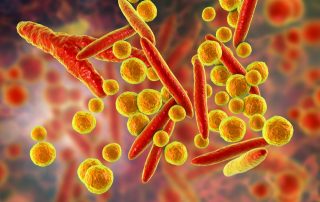STI testing
Want to stay on top of your sexual health? With Qoctor’s online doctor service, you can ask for a pathology request form for STI (Sexually Transmitted Infection) testing- both urine tests and blood tests are available. First, answer some simple online questions and have a brief phone/video consultation with one of our doctors, then download your pathology request form from your Qoctor account. Print the form and go to your local pathology collection centre to have your tests carried out. When we receive your results, they will be available to view on your Qoctor profile. You can book a free follow up results appointment to discuss the results if you wish to (e.g. if the results are abnormal).
About STI Tests
Some STIs don’t have any symptoms, so you may have an infection without even knowing it! This can be a problem as you can pass the infection on to a sexual partner without being aware. If an STI is not treated, you and/or your partner(s) could also end up with long term health issues. Getting regular sexual health check ups helps you to make sure you can feel safer and more confident in your sexual health.
A urine test can check for common infections such as Chlamydia, Gonorrhoea and Mycoplasma Genitalium.
For other bloodborne infections such as HIV, Hepatitis B&C, and Syphilis, you’ll need a blood test also.
Important: if you have symptoms suggestive of an STI or are feeling unwell, you will need in-person care. Go to your local doctor or sexual health clinic instead.

Common Questions and Answers
Health Library- Sexual Health
What is a fractured penis?
What is a fractured penis? Although the penis doesn’t have a bone in it, it can be fractured! A fractured penis occurs when the spongy tissue that swells during an erection is broken. It is incredibly rare- only occurring between 1 in 10,000 to 1 in 100,000 men. Request an STI test referral online How does a fractured penis happen? A fractured penis cannot happen when the penis is flaccid, because the tissue is soft & flexible. However, when the spongy tissue in the penis is firm during an erection, it is less flexible and more at risk of being injured. A fractured penis is most likely to happen during sex when it can be suddenly traumatised and bent unnaturally. What are the most common causes of a fractured penis? The position most [...]
Heavy periods- what causes heavy bleeding?
Heavy periods- what causes heavy bleeding? symptoms tests treatment How do you know if you have abnormally heavy periods? The amount of bleeding during a period varies from one woman to another. Abnormally heavy periods (also known as “menorrhagia”) occur when bleeding is heavy enough to have a negative impact on your usual activities and quality of life- physically, socially or emotionally. Women with heavy periods may: pass large clots leak or flood into their clothing need to change their pad or tampon every hour (or more often) by day, and may need to use both a tampon AND a pad some days to avoid leaking need to get up at night to change their pad or tampon have low iron levels, which can lead to anaemia. Iron deficiency anaemia happens when there’s not enough iron in your red blood cells- with heavy periods, iron [...]
The mini pill-10 common questions doctors get asked
10 questions women often ask about the mini pill what is it? Is it effective? contraindications side effects What is the mini pill and what is it used for? The mini pill (also known as the progesterone only pill or POP for short) is used as a method of contraception (birth control). It’s frequently chosen when the combined oral contraceptive pill (COCP) is unsuitable for some reason, due to side effects or a contraindication. The mini pill is often used as a form of contraception for women who are breast-feeding (the COCP is not suitable in this situation as it can reduce the flow of milk). Some women may opt for the mini pill as it is less likely to cause blood clots than the COCP. So, how does the mini pill work? It thickens the mucus in the cervix, which makes it [...]
Endometriosis- what are the symptoms?
Endometriosis- symptoms, causes & management what is it symptoms tests treatment Endometriosis is a very common condition- affecting around 1 in 10 women, mainly between the ages of 25 and 40. It can be hard to diagnose as it doesn’t typically show up on blood tests or ultrasound scans. As well as that, symptoms can vary between women- it can be a relatively silent condition, or it can cause severe pelvic pain, fertility problems and other complications. It may also be incorrectly diagnosed as something else, such as irritable bowel syndrome. What is Endometriosis? If a woman has Endometriosis, the kind of tissue that lines the uterus (womb) also starts to grow outside the uterus, in places where it shouldn’t normally be- most commonly on and around the ovaries, the fallopian tubes, and occasionally the bowel or other locations. When a woman gets her [...]
Mycoplasma Genitalium- a common STI that people don’t know about
Mycoplasma Genitalium- a common STI that many people don't know about what is it? symptoms diagnosis treatment What is Mycoplasma Genitalium? Most people have heard of STIs such as Chlamydia, Gonorrhoea and Genital Herpes, but there is much less awareness about Mycoplasma Genitalium. However, we now know it’s quite a common infection, and doctors are starting to include it more frequently in STI checks. It is a sexually transmitted bacterial infection that can infect the urethra, vagina, cervix and anus. It’s especially important to be aware of it if you’ve got symptoms suggestive of an STI but have tested negative for Chlamydia and Gonorrhoea- in this situation it may be worth discussing a Mycoplasma test with your doctor. How do you get Mycoplasma Genitalium? It is passed on by having unprotected vaginal or anal sex. What are the [...]
Chlamydia- do I have it? what should I do?
Chlamydia- could I have it and what should I do? what is it? symptoms diagnosis treatment Chlamydia is the most common sexually transmitted infection (STI) in Australia. It is particularly common in people under the age of 30. All sexually active people should consider regular STI checks, particularly if they have multiple partners. It is common for people to have an STI but not have any symptoms. What is Chlamydia? Chlamydia is a common sexually transmitted infection, which can be caught by having vaginal, oral or anal sex. It is caused by bacteria that live in sexual fluids. What should you do if you think you have Chlamydia? If you know you’ve had sex with somebody who has Chlamydia you should get treatment for it. Whilst you may wish to be tested first, it is also OK to [...]






